Site Search
- resource provided by the Forum Network Knowledgebase.
Search Tip: Search with " " to find exact matches.
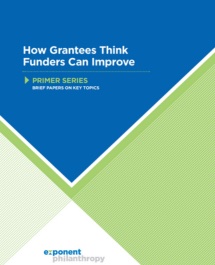
Funders want to be the best versions of themselves. A critical step on that journey is getting feedback from grantees. However, not every foundation has the time or capacity to collect grantee feedback.
Exponent Philanthropy helps lean...
ValuesAdvisor, a nonprofit online platform, helps you find the financial expertise needed to implement a mission-aligned investment strategy. Access to ValuesAdvisor is provided at no cost as a benefit of your membership in CNJG.
...
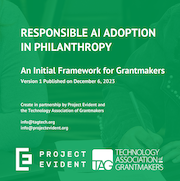
As society grapples with the increasing prevalence of AI tools, the "Responsible AI Adoption in Philanthropy" guide provides pragmatic guidance and a holistic evaluation framework for grantmakers to adopt AI in alignment with their core values. The...
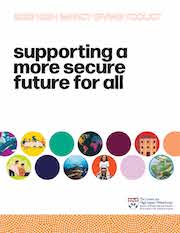
This document provides strategies for high-impact philanthropy, including examples of nonprofits using effective approaches. It also includes resources for due diligence, advancing equality, crisis-grantmaking, and tips for avoiding fraud.
Prorated dues for Grantmakers joining after July 1 and future dues investment amounts.
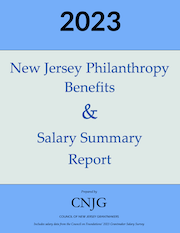
The 2023 New Jersey Philanthropy Benefits & Salary Summary Report provides a valuable benchmarking resource for CNJG members on the benefits offered to employees and trustees and salaries for employees. Developed and compiled exclusively...
CNJG’s first-ever Policy Agenda that includes our approach to the policy work, and five policy priorities.
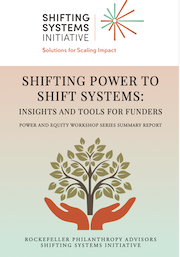
Shifting Power to Shift Systems: Insights and Tools for Funders is a new report from Rockefeller Philanthropy Advisors (RPA) that summarizes insights relating to power dynamics from leaders and experts on driving systems change.
Over the...
A corporate funder asked our corporate funder listserve about how the corporate foundation is funded either through an endowment or through periodic transfers, or though a share of the profits? This document is a compilation of the responses on the...
Foundations are systems. They have their own cultures and related assumptions, norms, standards, and practices. All of these personal, social, and structural factors affect our ability to learn.
This tool is to help foundations take stock...
CNJG COVID-19 Liability Waiver for in-person events.
The Council of New Jersey Grantmakers’ 2023 – 2027 Strategic Plan reimagines the future for CNJG. As a result of the extensive strategy development process, the plan includes a renewed vision, mission, core values, and goals. The work is informed by...
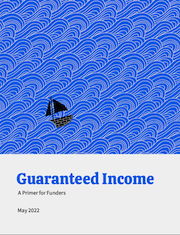
This primer was developed to educate foundations, individual donors, and other funders about the ways in which guaranteed income and related cash-based policies not only strengthen low and moderate income communities and communities of color, but also...
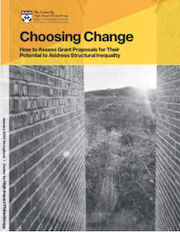
The COVID-19 global pandemic exacerbated longstanding disparities by race, gender, and socioeconomic status. Individuals, communities, and countries that were already vulnerable were even more at risk. The Choosing Change toolkit can help individual...
Much has changed since For Momentum’s first survey of corporate decision makers. They have found, across the board, that stakeholders have higher expectations of companies and their cause platforms. Consumers want companies to step up. Nonprofits need...
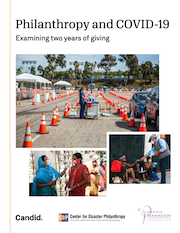
The second year of the coronavirus pandemic began optimistically with the promise of multiple, effective vaccines. However, 2021 proved to be a challenging and complex year. The pandemic continued to put pressure on economies and societies,...
The Council of New Jersey Grantmakers’ offers listserve services as a benefit of CNJG membership.
CNJG’s listserves facilitate ongoing group e-mail discussions among subscribed members. Members can share information and expertise, ask...
Philanthropy-serving organizations and their members are eligible for 25% off the subscription price for new subscriptions from Forum members and their member organizations. Inside Philanthropy works every day to explain who's funding what and why. It...
Amalgamated Bank is America’s socially responsible bank that specializes in supporting social change organizations, companies, and people working to make the world more just and sustainable...
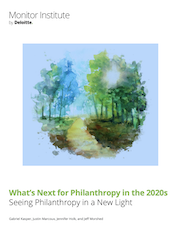
Based on interviews with more than two hundred philanthropy executives, practitioners, donors, board members, experts, and grantees around the world, this report, What's Next for Philanthropy in the 2020s: Seeing Philanthropy in a New Light,...
